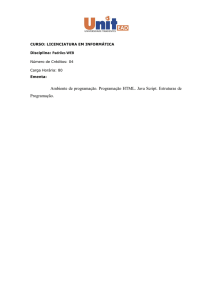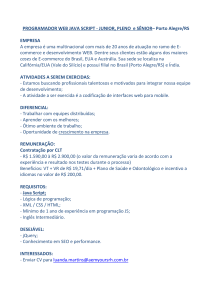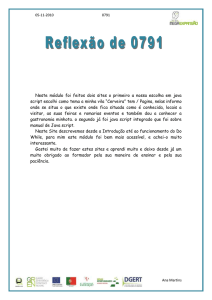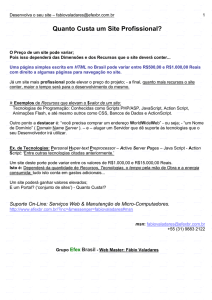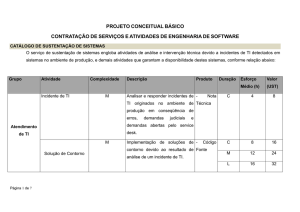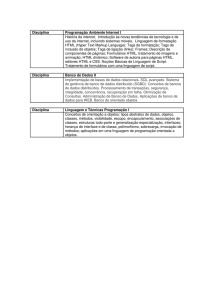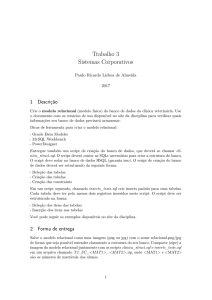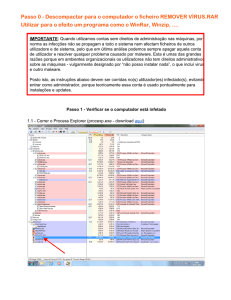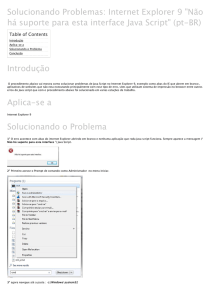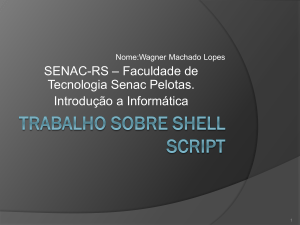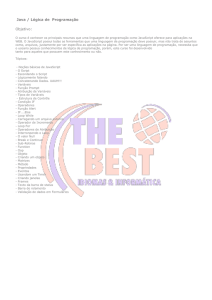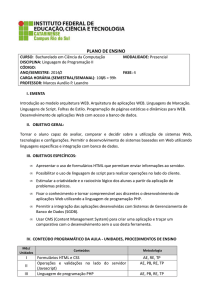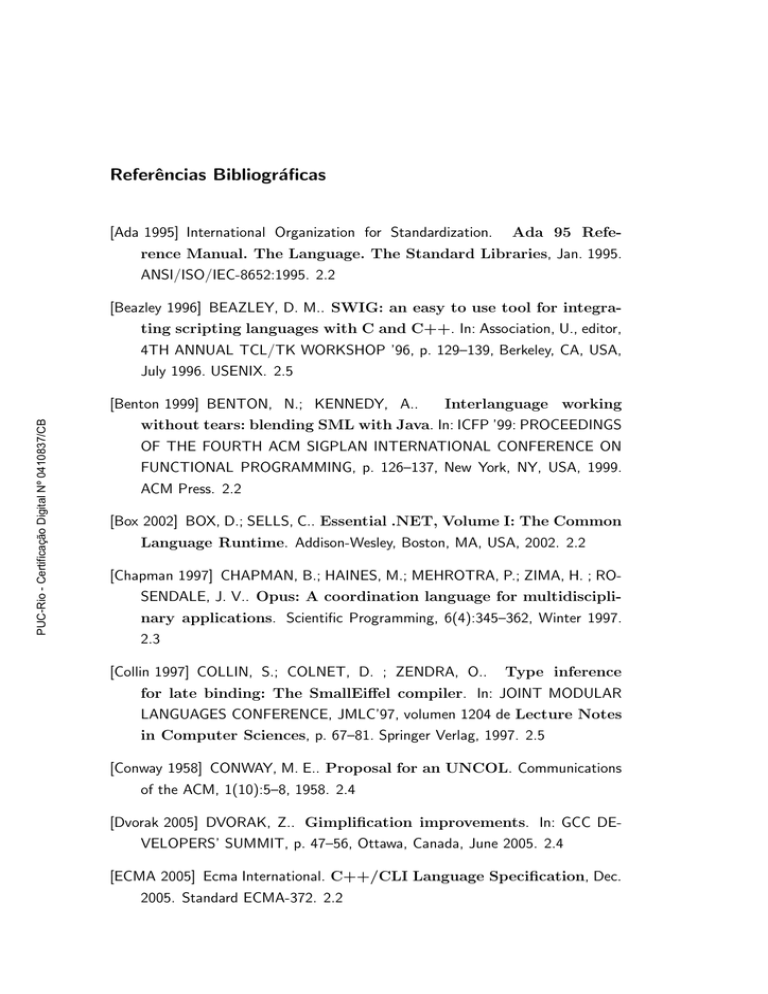
Referências Bibliográficas
[Ada 1995] International Organization for Standardization.
Ada 95 Refe-
rence Manual. The Language. The Standard Libraries, Jan. 1995.
ANSI/ISO/IEC-8652:1995. 2.2
[Beazley 1996] BEAZLEY, D. M.. SWIG: an easy to use tool for integrating scripting languages with C and C++. In: Association, U., editor,
4TH ANNUAL TCL/TK WORKSHOP ’96, p. 129–139, Berkeley, CA, USA,
PUC-Rio - Certificação Digital Nº 0410837/CB
July 1996. USENIX. 2.5
[Benton 1999] BENTON, N.; KENNEDY, A..
Interlanguage working
without tears: blending SML with Java. In: ICFP ’99: PROCEEDINGS
OF THE FOURTH ACM SIGPLAN INTERNATIONAL CONFERENCE ON
FUNCTIONAL PROGRAMMING, p. 126–137, New York, NY, USA, 1999.
ACM Press. 2.2
[Box 2002] BOX, D.; SELLS, C.. Essential .NET, Volume I: The Common
Language Runtime. Addison-Wesley, Boston, MA, USA, 2002. 2.2
[Chapman 1997] CHAPMAN, B.; HAINES, M.; MEHROTRA, P.; ZIMA, H. ; ROSENDALE, J. V.. Opus: A coordination language for multidisciplinary applications. Scientific Programming, 6(4):345–362, Winter 1997.
2.3
[Collin 1997] COLLIN, S.; COLNET, D. ; ZENDRA, O..
Type inference
for late binding: The SmallEiffel compiler. In: JOINT MODULAR
LANGUAGES CONFERENCE, JMLC’97, volumen 1204 de Lecture Notes
in Computer Sciences, p. 67–81. Springer Verlag, 1997. 2.5
[Conway 1958] CONWAY, M. E.. Proposal for an UNCOL. Communications
of the ACM, 1(10):5–8, 1958. 2.4
[Dvorak 2005] DVORAK, Z.. Gimplification improvements. In: GCC DEVELOPERS’ SUMMIT, p. 47–56, Ottawa, Canada, June 2005. 2.4
[ECMA 2005] Ecma International. C++/CLI Language Specification, Dec.
2005. Standard ECMA-372. 2.2
Referências Bibliográficas
116
[Ewing 2006] EWING, G.. Pyrex - a language for writing Python extension modules, 2006. http://www.cosc.canterbury.ac.nz/greg.
ewing/python/Pyrex/. 2.5
[Finne 1998] FINNE, S.; LEIJEN, D.; MEIJER, E. ; JONES, S. P.. H/Direct: a
binary foreign language interface for Haskell. In: ICFP ’98: PROCEEDINGS OF THE THIRD ACM SIGPLAN INTERNATIONAL CONFERENCE ON FUNCTIONAL PROGRAMMING, p. 153–162, New York, NY,
USA, 1998. ACM Press. 1
[Gelernter 1985] GELERNTER, D.. Generative communication in Linda.
ACM Transactions on Programming Languages and Systems, 7(1):80–112,
1985. 2.3
PUC-Rio - Certificação Digital Nº 0410837/CB
[Gosling 2000] GOSLING, J.; JOY, B.; STEELE, G. ; BRACHA, G.. The Java
Language Specification. Addison-Wesley, Boston, MA, USA, 2nd edition,
2000. 1.1
[Hugunin 1997] HUGUNIN, J.. Python and Java - the best of both
worlds. In: PROCEEDINGS OF THE 6TH INTERNATIONAL PYTHON
CONFERENCE, p. 11–20, San Jose, CA, USA, Oct. 1997. 2.2
[ISO 2006] International Organization for Standardization. C# Language Specification, June 2006. ISO/IEC 23270:2003. 2.2
[Ierusalimschy 2006] IERUSALIMSCHY, R.. Programming in Lua. Lua.org,
2nd edition, Mar. 2006. 1.1, 5
[Jones 1993] JONES, S. P.; HALL, C. V.; HAMMOND, K.; PARTAIN, W. ;
WADLER, P.. The Glasgow Haskell Compiler: a technical overview.
In: PROC. UK JOINT FRAMEWORK FOR INFORMATION TECHNOLOGY
(JFIT) TECHNICAL CONFERENCE, p. 249–257, Keele, Staffordshire, UK,
Mar. 1993. 2.1
[Jones 1999] JONES, S. L. P.; RAMSEY, N. ; REIG, F.. C--: A portable
assembly language that supports garbage collection. In: PPDP
’99: PROCEEDINGS OF THE INTERNATIONAL CONFERENCE PPDP’99
ON PRINCIPLES AND PRACTICE OF DECLARATIVE PROGRAMMING,
p. 1–28, London, UK, 1999. Springer-Verlag. 2.4
[KDE 2006] KDE.ORG. KDE developer’s corner - Language bindings,
Oct. 2006. http://developer.kde.org/language-bindings/. 2.5
Referências Bibliográficas
117
[Liang 1999] LIANG, S.. Java Native Interface: Programmer’s Guide
and Reference. Addison-Wesley Longman Publishing Co., Inc., Boston,
MA, USA, 1999. 2.5, 3.1.3
[Lindholm 1999] LINDHOLM, T.; YELLIN, F.. The Java Virtual Machine
Specification. Addison-Wesley, 2nd edition, April 1999. 2.2
[MacEachern 2006] MACEACHERN, D.; ORWANT, J.. perlembed(1). Perl 5
Porters, 5.8.8 edition, Jan. 2006. http://perldoc.perl.org/perlembed.
html. 3.4.5, 4.1.2
[Manzur 2006] MANZUR, A.; CELES, W.. toLua++ reference manual, Apr.
2006. http://www.codenix.com/∼ tolua/tolua++.html. 2.5
[Marquess 2006] MARQUESS, P.. perlcall(1). Perl 5 Porters, 5.8.8 edition, Jan.
PUC-Rio - Certificação Digital Nº 0410837/CB
2006. http://perldoc.perl.org/perlcall.html. 3.1.5
[Metzner 1979] METZNER, J. R.. A graded bibliography on macro
systems and extensible languages. SIGPLAN Not., 14(1):57–64, 1979.
2.4
[Moura 2004] DE MOURA, A. L.; RODRIGUEZ, N. ; IERUSALIMSCHY, R..
Coroutines in Lua. Journal of Universal Computer Science, 10(7):910–
925, July 2004. 2.5
[Niemeyer 2006] NIEMEYER, G.. Lunatic Python, July 2006. http://labix.
org/lunatic-python. 2.4
[OMG 2002] Object Management Group, Inc., Framingham, MA, USA. The
Common Object Request Broker: Architecture and Specification, Version 3.0, July 2002. 2.3
[Okamoto 2006b] OKAMOTO, J.. perlguts(1). Perl 5 Porters, 5.8.8 edition,
Jan. 2006. http://perldoc.perl.org/perlguts.html. 3.1.5
[Okamoto 2006a] OKAMOTO, J.; ROEHRICH, D.. perlapi(1). Perl 5 Porters, 5.8.8 edition, Jan. 2006. http://perldoc.perl.org/perlapi.html.
3.4.5, 4.2.3
[Ousterhout 1990] OUSTERHOUT, J. K.. Tcl: An embeddable command
language. In: PROCEEDINGS OF THE USENIX WINTER 1990 TECHNICAL CONFERENCE, p. 133–146, Berkeley, CA, 1990. USENIX Association.
2.6.2
118
Referências Bibliográficas
[Ousterhout 1994] OUSTERHOUT, J. K.. Tcl and the Tk Toolkit. Addison
Wesley, 1994. 2.6.2
[Ousterhout 1998] OUSTERHOUT, J. K.. Scripting: Higher-level programming for the 21st century. IEEE Computer, 31(3):23–30, 1998. 1, 2.6
[Peterson 2001] PETERSON, P.; MARTINS, J. R. R. A. ; ALONSO, J. J.. Fortran to Python interface generator with an application to aerospace engineering. In: PROCEEDINGS OF THE 9TH INTERNATIONAL
PYTHON CONFERENCE, Long Beach, CA, USA, Mar. 2001. 2.4
[Randal 2004] RANDAL, A.; SUGALSKI, D. ; TOETSCH, L.. Perl 6 and
Parrot Essentials. O’Reilly Media, Inc., 2nd edition, 2004. 2.2
[Roehrich 2006] ROEHRICH, D.. perlxs(1). Perl 5 Porters, 5.8.8 edition, Jan.
2006. http://perldoc.perl.org/perlxs.html. 19
PUC-Rio - Certificação Digital Nº 0410837/CB
[Stepanian 2005] STEPANIAN, L.; BROWN, A. D.; KIELSTRA, A.; KOBLENTS,
G. ; STOODLEY, K.. Inlining Java native calls at runtime. In:
VEE ’05: PROCEEDINGS OF THE 1ST ACM/USENIX INTERNATIONAL
CONFERENCE ON VIRTUAL EXECUTION ENVIRONMENTS, p. 121–131,
New York, NY, USA, 2005. ACM Press. 3.1.3
[Sun 2003] Sun Microsystems. Java Native Interface 5.0 Specification,
5.0 edition, 2003. http://java.sun.com/j2se/1.5.0/docs/guide/jni/.
3.2.3
[Syme 2006] SYME, D.; MARGETSON, J..
Microsoft F#, 2006.
http:
//research.microsoft.com/fsharp/. 2.2
[Tarditi 1992] TARDITI, D.; LEE, P. ; ACHARYA, A.. No assembly required:
compiling standard ML to C. ACM Lett. Program. Lang. Syst.,
1(2):161–177, 1992. 2.1
[Thomas 2002] THOMAS, R.. Lua Technical Note 4 - a thin API for
interlanguage working, or Lua in four easy calls, Aug. 2002.
http://www.lua.org/notes/ltn004.html. 4.1.2
[Thomas 2004] THOMAS, D.; HUNT, A.. Programming Ruby: The Pragmatic Programmer’s Guide. Addison Wesley Longman, Inc., Boston,
MA, USA, 2nd edition, 2004. 1.1, 3.2.2, 5
[Tolmach 1998] TOLMACH, A. P.; OLIVA, D.. From ML to Ada: Stronglytyped language interoperability via source translation. Journal of
Functional Programming, 8(4):367–412, 1998. 2.1
119
Referências Bibliográficas
[Wall 2000] WALL, L.; CHRISTIANSEN, T. ; ORWANT, J.. Programming
Perl. O’Reilly, 3rd edition, July 2000. 1.1
[Welch 1995] WELCH, B. B.; JONES, K. ; HOBBS, J.. Practical programming in Tcl and Tk. Prentice-Hall, Inc., Upper Saddle River, NJ, USA,
1995. 2.6.2
[Wilson 1992] WILSON, P. R..
Uniprocessor garbage collection tech-
niques. In: PROC. INT. WORKSHOP ON MEMORY MANAGEMENT,
número 637 em Lecture Notes in Computer Sciences, p. 1–42, Saint-Malo,
France, 1992. Springer-Verlag. 3.2.2
[van Rossum 1999] VAN ROSSUM, G.. Python/C API Reference Manual.
Corporation for National Research Initiatives (CNRI), Reston, VA, USA, 1.5.2
PUC-Rio - Certificação Digital Nº 0410837/CB
edition, Apr. 1999. http://www.python.org/doc/1.5.2/api/api.html.
4
[van Rossum 2006b] VAN ROSSUM, G.. Python Reference Manual. Python
Software Foundation, 2.4.3 edition, Mar. 2006. http://docs.python.org/
ref/. 1.1, 4.1.2
[van Rossum 2006a] VAN ROSSUM, G.. Extending and Embedding the
Python Interpreter, 2.4.3 edition, March 2006. http://docs.python.
org/ext/ext.html. 3.1.1, 3.2.1, 4.1.2
[van Rossum 2006c] VAN ROSSUM, G.. Python/C API Reference Manual. Python Software Foundation, 2.4.3 edition, Mar. 2006. http:
//docs.python.org/api/api.html. 3.1.1, 4
A
API de LibScript
A.1
Inicialização e Término
– script env* script init(const char* namespace)
Inicializa LibScript e retorna um ponteiro para o ambiente virtual. O
parâmetro namespace indica o nome a ser usado nas estruturas a serem
PUC-Rio - Certificação Digital Nº 0410837/CB
criadas no espaço de nomes das máquinas virtuais para representar o
ambiente virtual.
– void script done(script env* env)
Encerra o ambiente virtual.
A.2
Registro de Funções
– typedef script err (*script fn)(script env*)
Tipo das funções C a serem registradas no ambiente virtual. Ao expor
uma API existente para LibScript, a função tipicamente será uma função
wrapper que carrega os parâmetros de entrada do ambiente, chama uma
função do programa e envia os parâmetros de saı́da de volta ao ambiente.
– script err script new function(script env* env, script fn fn,
const char* name)
Registra uma função no ambiente virtual.
A.3
Buffer de parâmetros
– double script get double(script env* env, int index)
int script get int(script env* env, int index)
int script get bool(script env* env, int index)
const char* script get string(script env* env, int index)
Obtêm dados do buffer. Estas funções devem ser chamadas ao inı́cio das
funções wrapper. Para cada parâmetro de entrada, uma chamada deve ser
realizada. Ao fim, pode-se invocar a macro SCRIPT CHECK INPUTS(env),
Apêndice A. API de LibScript
121
que encerra a função retornando um código de erro caso alguma leitura
com alguma destas funções não tenha encontrado um dado do tipo esperado (A API não realiza conversões automáticas entre strings e números).
Em script get string, a string retornada pertence ao chamador, que
passa a ser responsável por desalocá-la.
– script type script get type(script env* env, int index)
int script buffer len(script env* env)
Estas funções permitem escrever funções em C que realizam verificação
de tipo e número de parâmetros em tempo de execução. A função
script get type obtém o tipo do elemento do buffer solicitado e
script buffer len retorna o número de parâmetros no buffer.
PUC-Rio - Certificação Digital Nº 0410837/CB
– void script put double(script env* env, int index, double
value)
void script put int(script env* env, int index, int value)
void script put bool(script env* env, int index, int value)
void script put string(script env* env, int index, const
char* value)
Inserem dados no buffer. Ao final de uma função, os valores de retorno
devem ser passados com chamadas a estas funções e um código de erro
SCRIPT OK como retorno da função C.
– void script reset buffer(script env* env)
Esvazia o buffer.
A.4
Executando Código
– script err script run(script env* env, const char* language,
const char* code)
Executa uma string de código em uma dada linguagem. Se necessário, o
plugin apropriado é carregado e inicializado.
– script err script run file(script env* env, const char*
filename)
Função de conveniência; carrega o texto de um arquivo e o executa com
script run. A linguagem é detectada a partir da extensão do arquivo.
– script err script call(script env* env, const char* fn)
Requisita a execução de uma função em algum dos plugins cadastrados.
Os parâmetros de entrada devem ser passados anteriormente com chamadas às funções script put *; valores de retorno podem ser obtidos com
script get *. Inicialmente, a tabela de funções C do ambiente virtual
Apêndice A. API de LibScript
122
é consultada. Não havendo uma função definida em C, os plugins são
consultados na seqüência em que foram inicializados implicitamente via
script run ou script run file: funções registradas na representação
do ambiente virtual definido para a LibScript na máquina virtual da
linguagem (isto é, no nome criado com script init) são acessı́veis via
script call.
– script err script error(script env* env)
const char* script error message(script env* env)
void script set error message(script env* env, const char*
message)
Obtém o código e a mensagem de erro mais recentes do ambiente. Após
uma chamada a script error, o código de erro é zerado de volta para
SCRIPT OK. A mensagem de erro, por sua vez, não é zerada. A função
script set error message define um novo valor para a mensagem de
erro do ambiente. Permite ao plugin propagar à aplicação as mensagens
PUC-Rio - Certificação Digital Nº 0410837/CB
de erro da máquina virtual.
– const char* script get namespace(script env* env)
Retorna o nome do namespace registrado com script init.
A.5
API Exportada por Plugins
As chamadas aos plugins que implementam interfaces com as várias
máquinas virtuais são realizadas internamente pela biblioteca principal, que
espera encontrar as seguintes funções:
– script plugin state script plugin init linguagem(script env*
env)
Responsável por inicializar o plugin. Durante a inicialização, o espaço
de nomes do ambiente virtual deve ser exposto à máquina virtual de
alguma forma apropriada para a linguagem (como uma tabela em Lua,
ou um módulo em Python, ou ainda uma classe em Ruby). A rotina
de inicialização pode retornar um handle que será passado de volta
a ele nas chamadas subseqüentes. O estado da máquina virtual e o
ponteiro para o ambiente LibScript devem ser armazenados de modo a
ser posteriormente acessı́veis a partir deste handle.
– script err script plugin run linguagem(script plugin state
st, char* text)
Envia código para execução na máquina virtual. Esta função é utilizada internamente por script run e script run file. Deve retornar
Apêndice A. API de LibScript
123
SCRIPT OK em caso de sucesso, SCRIPT ERRLANGCOMP para erros de compilação ou SCRIPT ERRLANGRUN para erros de execução, preferencialmente
definindo uma mensagem de erro com script set error message.
– script err script plugin call linguagem(script plugin state
st, char* fn)
Realiza a chamada de uma função que tenha sido definida nativamente
no espaço de nomes do ambiente na máquina virtual do plugin. Ao chamar uma função no espaço de nomes, seja em C através de script call
ou executando código em algum dos plugins, LibScript irá utilizar
esta função para tentar executar a função no contexto do plugin. Se
a função não foi definida no plugin, o valor SCRIPT ERRFNUNDEF deve
ser retornado. Caso contrário, ela deve ser executada, com parâmetros
PUC-Rio - Certificação Digital Nº 0410837/CB
de entrada obtidos através de script get * e valores de retorno enviados com script put *, e os valores SCRIPT OK ou SCRIPT ERRLANGRUN
devem ser retornados, conforme apropriado.
– void script plugin done linguagem(script plugin state st)
Responsável pelo encerramento do ambiente.

